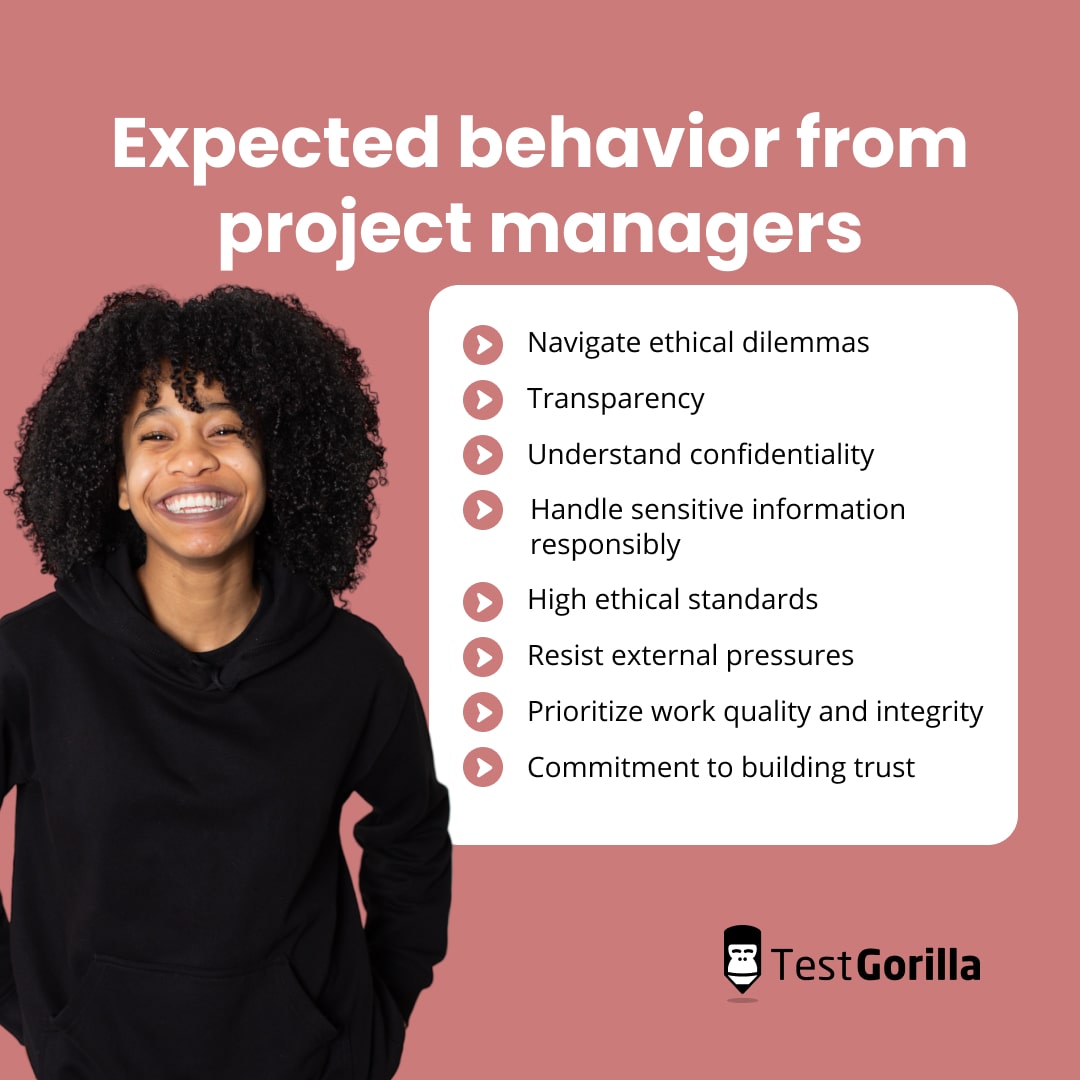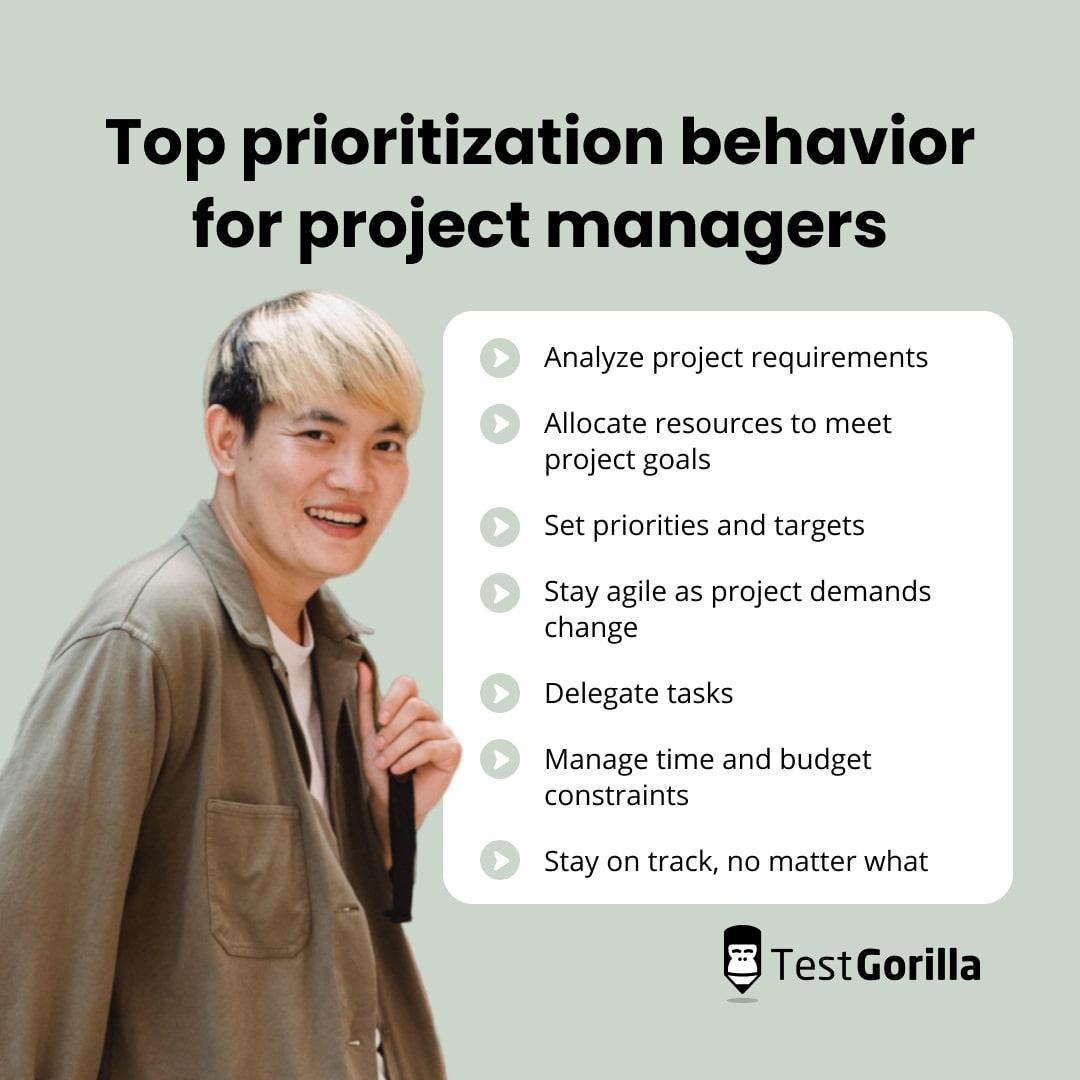Identifying the right project manager among a pool of applicants is daunting, and the wrong hiring decision can lead to project delays and strained team dynamics.
Using behavioral interview questions in your hiring process gives candidates the chance to illustrate and reinforce the role-specific skills displayed on their resume with examples from past workplace experiences.
We’ve put together a guide with relevant behavioral interview questions for your open project manager position, so you can select a candidate who will drive success at your organization.
Table of contents
What are behavioral interview questions?
Behavioral interview questions are designed to assess a candidate's past behavior in specific situations. They provide insights into how applicants may perform in similar circumstances in the future.
Unlike traditional interview questions, which can focus on hypothetical scenarios or general knowledge, behavioral questions ask candidates for real-life examples from their previous project management experiences.
Why ask behavioral questions during an interview?
While there’s no crystal ball to help you predict how a candidate will fare after being hired, behavioral assessments and interviews can help.
Interview questions can assist in providing a more complete picture of a candidate, such as, “How did you handle a project going over budget in the past?” And, “What have you done when two team members didn’t get along?”
Behavioral interview questions let you uncover a candidate's decision-making processes and how they coped with challenges. They also enable you to predict how a candidate will behave in the future.
50 behavioral interview questions for project managers and answers to look for
Behavioral interview questions are an objective way to evaluate job candidates by asking them to explain past successes, challenges, and project decisions.
Here we share 50 project manager behavioral interview questions to help you focus on the skills most needed in your organization.
Teamwork behavior questions for project managers
Project managers not only need to lead teams, but collaborate effectively with others to get projects to the finish line.
When assessing candidates, you’ll want to seek out teamwork traits and skills, such as:
Relationship-building
Collaboration
Conflict resolution
Constructive discussions
Team motivation and inspiration
On the other hand, you will want to be aware of candidates who can’t handle opposing viewpoints or prefer to work on their own.
Here are some questions to ask to uncover these traits:
Can you describe a time when you had to work with a diverse team with varying opinions and perspectives? How did you keep everyone pulling together?
Tell me about a project where you had to manage conflicting priorities and interests. How did you handle it?
Share an example of a time when you had to step into a leadership role. How did you inspire and motivate your teammates?
Can you describe a project where your team was collaborating well? How did your actions contribute to that success?
In past project management roles, what are some of the ways you have fostered successful teamwork? What do you think worked best?
Customer service behavior questions for project managers
Since project managers spend time interacting with clients, often navigating problems or challenges, they need excellent customer service skills.
Look for candidates who possess:
Skillful communication
The ability to build positive relationships with stakeholders
Dedication to exceptional service that goes above and beyond
A creative mindset
Expectation-management skills
Empathy
A client-centric approach
You will want to avoid candidates who get personally involved or lack the ability to actively listen to concerns.
The following questions can help you find the necessary qualities in applicants:
Describe a situation where you had to manage a demanding or dissatisfied client or stakeholder. How did you handle the situation, and what was the outcome?
Can you share an example of a time when you went above and beyond to ensure customer satisfaction? How did you exceed their expectations?
Tell us about a project where you had to manage competing demands from multiple clients or stakeholders. What did you do and what was the outcome?
What are some steps you have taken to build positive relationships with clients or customers? What worked?
What is the biggest lesson you have learned in customer service during your career? How did you learn the lesson?
Adaptability behavior questions for project managers
Adapting to new technologies and situations is essential for project managers because company goals and projects are always changing.
You’ll want to look for applicants who can:
Quickly assess situations
Stay passionate about learning
Come up with creative solutions on the fly
Make decisions
Stay resourceful
Conversely, you may want to skip candidates who are ambivalent about learning and who have no history of seeking development opportunities.
The following questions help you target candidates who can thrive in dynamic workplaces:
Describe a situation where you had to change course mid-project due to unforeseen circumstances. How did you handle the change, and what was the result?
Can you share an example of a time when you had to work with a tight deadline or unexpected resource constraints? How did you adjust your approach?
Tell us about a project where you had to work with evolving technologies or tools. How did you adapt to the changes, and how did it impact the project's success?
What has been the biggest change you have seen in your industry during your work as a project manager? How did you handle this change?
What are the biggest changes on the horizon for your industry? What are you doing now to prepare for them?
Time management behavior questions for project managers
Project managers need to stay organized and on top of their schedules to keep projects on track.
When asking time management questions, look for applicants who display:
Effective prioritization and evaluation of tasks
Strong organizational skills
Good communication
Problem-solving abilities
Use these questions to find candidates who keep projects on schedule:
How do you approach prioritizing tasks and managing competing deadlines? Can you share a specific example?
Describe a situation where a team member suddenly couldn’t work or didn’t show up. How did you keep the project on schedule?
Tell us about a time when you faced unexpected delays or setbacks in a project. How did you adjust the schedule to get back on track?
Describe a project where you had to manage multiple stakeholders' expectations and deliverables within a tight timeframe. How did you ensure timely completion?
Tell us about three different ways you have had to prioritize tasks. Why did you choose each approach and what was the situation?
Communication behavior questions for project managers
The ability to communicate complex ideas simply and to interact effectively with different team members is important for any project manager. Part of their success means being able to explain what needs to be done and why.
In interview questions, applicants should demonstrate:
Empathy
Strong emotional intelligence
Acknowledgment of differing communication styles
Candidates who struggle to articulate themselves or their ideas clearly in the interview could be a cause for concern.
You will want to find candidates with adaptable communication styles and active listening capabilities by using questions like these:
Can you describe a challenging situation where miscommunication occurred in a project? How did you address it and prevent future misunderstandings?
Tell us about a project where you had to communicate complex information to non-technical stakeholders. How did you ensure understanding and engagement?
Share an example of a time when you had to deliver difficult feedback. How did you approach the conversation, and what was the outcome?
Which communication styles have you found most challenging in your career and what did you do to communicate effectively?
How do you feel communication is changing in today’s world and what are you doing to adapt?
Motivation and values behavior questions for project managers
Behavioral interview questions for project managers can help you determine which applicants are self-motivated and goal-oriented. You can use these questions in conjunction with TestGorilla’s Motivation test to get more insight into what drives candidates.
Look for candidates who show they are:
Driven to excel, even without external pressure
Dedicated to delivering results that contribute to your organization's success
Use the following questions to understand a candidate's motivation and alignment with your organization's values.
What motivates you as a project manager? Can you share an example of a project where you went above and beyond due to your intrinsic motivation?
How do you ensure your work aligns with the organization's values and goals? Can you provide an example of a project where you demonstrated this alignment?
Can you describe a time when you had to make a difficult values-based decision during a project? How did you handle it, and what were the outcomes?
What are your core values as a project manager, and how have they shown up in projects?
Can you describe a project where it was difficult to meet project goals? How did you stay on track?
As you ask these questions, look for responses that show applicants are driven to act for the best outcome of projects and teams. Be wary of candidates who have unclear values and who seem casual about project success.
Ethics and integrity behavior questions for project managers
Sensitive information and critical decisions are part of a project manager’s role.
You will want to find a candidate whose past actions show:
The ability to navigate ethical dilemmas
Transparency
An understanding of confidentiality
An ability to handle sensitive information responsibly
High ethical standards
Ability to resist external pressures
A willingness to prioritize work quality and integrity
A commitment to building trust
These questions can help you find project managers who are committed to ethical conduct and accountability:
Describe a situation where you faced conflicting interests between project stakeholders. How did you ensure fairness and maintain your integrity?
Can you provide an example of a time when you had to handle confidential or sensitive information during a project? How did you ensure discretion and maintain trust?
Share an example of a project where you faced pressure to compromise on quality or ethical standards. How did you handle the situation, and what was the outcome?
Tell us about a time when you had to be transparent and authentic, even though it was difficult. What happened?
What standard do you hold yourself to? How has this shown up in the workplace?
Growth potential behavior questions for project managers
Project managers must be able to encourage growth in their teams, and this means being focused on their own development and education, too.
These questions will help you find project managers who are continuously learning in a rapidly evolving professional landscape.
How do you stay updated on industry trends and best practices in project management?
Can you share an example of how you applied new knowledge to a project?
Describe a time when you took the initiative to enhance your project management skills. How did you go about it, and what were the results?
Can you provide an example of a project where you had to adapt to new technologies or methodologies? How did you approach the learning curve, and how did it impact the project's success?
Tell us about a time you realized you needed to focus on skill-building. What made you aware of a knowledge gap and what did you do about it?
Prioritization behavior questions for project managers
To ensure project success, project managers need to allocate resources and manage deadlines and budgets.
You’ll want responses that demonstrate a candidate’s ability to:
Analyze project requirements
Allocate resources to meet project goals
Set priorities and targets
Stay agile as project demands change
Delegate tasks
Manage time and budget constraints
Stay on track, no matter what
The following questions help you find managers with organizational skills and the ability to manage competing demands:
How do you prioritize tasks and allocate resources to ensure project success? Tell us about a specific project where you did this.
Can you provide an example of a complex project where you effectively managed priorities?
Describe a time when you had to reprioritize tasks due to shifting project requirements. How did you manage the changes, and what impact did it have on the project?
Can you share an example of a project where you had to manage multiple deliverables with competing deadlines? How did you approach the situation?
Tell us about a time when your team changed during a project. How did you adapt and how did it affect the outcome?
Leadership behavior questions for project managers
Teams with strong project managers are inspired and guided to success.
When evaluating applicants, look for responses that show:
Examples of building strong and collaborative relationships
The ability to resolve conflicts
Experience in motivating teams to overcome obstacles
The questions in this section enable you to find applicants who demonstrate leadership qualities and can guide teams to success:
Describe a project where you led a diverse team. How did you ensure your leadership style met the needs of every team member?
Can you share an example of a project where you faced resistance from team members? How did you handle the situation?
Tell us about a time when you had to make a difficult decision that impacted the project and the team. How did you approach the decision-making process, and how did you communicate the decision?
Describe a project where morale became low. What happened and how did you get team members excited about the project again?
Describe your first and your most recent project management experiences. How has your leadership style changed, and what contributed to the change?
How to roll out behavioral interviews
Behavioral questions are a powerful way to see how project manager candidates have handled specific situations in the past, and what skills they can bring to your company.
But they’re only one part of the picture. TestGorilla makes it easy to incorporate your own behavioral questions with a powerful multi-measure testing technique that uses personality evaluations such as the 16-Types test, DISC, and Enneagram to learn more about every applicant.
TestGorilla recommends relevant tests for your project manager role from an extensive library of 300-plus tests. You can include job-specific skills tests, such as the Project Management test, cognitive ability, language proficiency, and more.
You can ask candidates to answer behavioral questions with written responses or even recorded video replies.
Further, TestGorilla provides learning resources and guides, such as how to assess project manager skills, so you can always make the right hire.
Conclusion
Incorporating behavioral interview questions when recruiting project managers can help you identify candidates who can collaborate, adapt, communicate, and prioritize.
Along with TestGorilla’s pre-employment assessments, you can seamlessly roll out behavioral interviews for an objective hiring process to find the right project manager.
TestGorilla provides in-depth reports that give you a way to accurately compare project manager skills, including soft skills, across your applicant pool. You can see at a glance which candidates are best suited for your open position and review their answers to every question in detail.
To find out how TestGorilla can help you hire your next project manager, sign up for a free 30-minute live demo to learn how TestGorilla can improve your hiring process.
Can’t wait? Our product tour makes it easy to see the powerful features of our platform in action.
Related posts
Hire the best candidates with TestGorilla
Create pre-employment assessments in minutes to screen candidates, save time, and hire the best talent.
Latest posts
The best advice in pre-employment testing, in your inbox.
No spam. Unsubscribe at any time.

Hire the best. No bias. No stress.
Our screening tests identify the best candidates and make your hiring decisions faster, easier, and bias-free.
Free resources
This checklist covers key features you should look for when choosing a skills testing platform
This resource will help you develop an onboarding checklist for new hires.
How to assess your candidates' attention to detail.
Learn how to get human resources certified through HRCI or SHRM.
Learn how you can improve the level of talent at your company.
Learn how CapitalT reduced hiring bias with online skills assessments.
Learn how to make the resume process more efficient and more effective.
Improve your hiring strategy with these 7 critical recruitment metrics.
Learn how Sukhi decreased time spent reviewing resumes by 83%!
Hire more efficiently with these hacks that 99% of recruiters aren't using.
Make a business case for diversity and inclusion initiatives with this data.





















